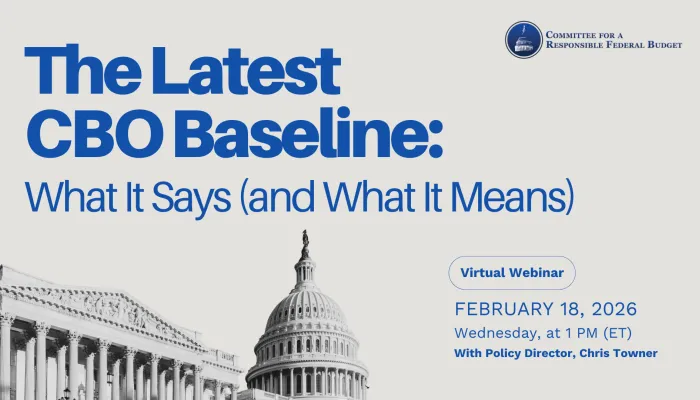Report: Analysis of CBO’s Updated Budget and Economic Outlook August 2015
The Congressional Budget Office (CBO) today released its updated budget and economic projections for the coming decade, showing that while short-term deficits are down, the debt continues to grow unsustainably over the long term. The report focuses on a “current law” baseline, which assumes policymakers generally pay for passing any new or extended tax cuts or spending increases. Under this scenario, CBO shows the following:
- Deficits will fall to $426 billion (2.4 percent of GDP) in 2015 and $414 billion (2.2 percent of GDP) in 2016, but will grow from there with trillion-dollar deficits returning by 2025, when annual borrowing will total 3.7 percent of GDP.
- Debt held by the public will grow by nearly $8 trillion between now and 2025, from over $13 trillion today to $21 trillion by 2025. As a share of GDP, debt will remain near its post-World War II record high of 74 percent through 2021, before rising to about 77 percent of GDP by 2025.
- Spending will grow from 20.6 percent of GDP in 2015 to 22.0 percent in 2025 while revenues will remain at about 18.3 percent of GDP.
- Interest spending represents the fastest growing major part of the budget, rising from $218 billion (1.2 percent of GDP) in 2015 to $755 billion (2.8 percent of GDP) by 2025. Spending on the major health and retirement programs will grow from 10 to 12 percent of GDP.
- CBO’s projections are quite similar to those made in March, with lower interest rates improving the forecast but being largely offset by various technical changes and the recent permanent “doc fix” legislation.
- Extrapolating forward, we project debt would likely exceed the size of the economy by around 2040, and continue to grow thereafter.
- We project under the assumptions of CBO’s Alternative Fiscal Scenario, where Congress extends various expired and expiring tax provisions and eliminates ”sequestration,” debt would exceed 85 percent of GDP by 2025 and exceed the size of the economy by around 2030.
CBO shows an unsustainable fiscal outlook under current law, and an even more dangerous one if policymakers continue to act irresponsibly. Lawmakers will therefore need to strictly abide by pay-as-you-go rules and take steps to control the growth of entitlement spending, while enacting other tax and spending reforms to put debt on a downward path over the long run.
See the full document below or download it here.
What's Next
-
Image

-
Image

-
Image
